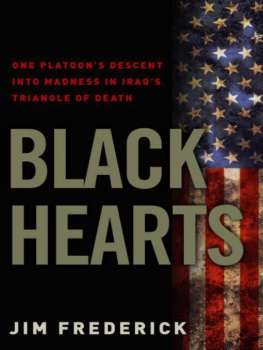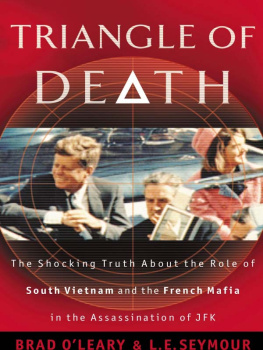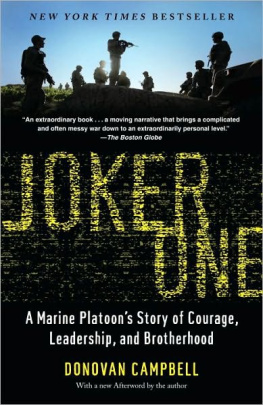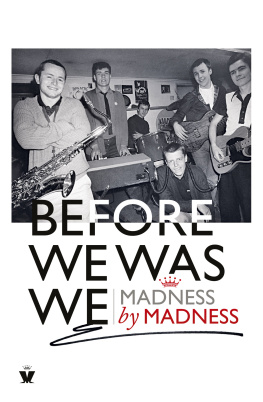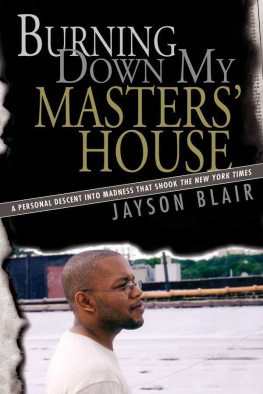Jim Frederick - Black Hearts: One Platoons Descent into Madness in Iraqs Triangle of Death
Here you can read online Jim Frederick - Black Hearts: One Platoons Descent into Madness in Iraqs Triangle of Death full text of the book (entire story) in english for free. Download pdf and epub, get meaning, cover and reviews about this ebook. year: 2011, publisher: Crown Publishing Group, genre: History. Description of the work, (preface) as well as reviews are available. Best literature library LitArk.com created for fans of good reading and offers a wide selection of genres:
Romance novel
Science fiction
Adventure
Detective
Science
History
Home and family
Prose
Art
Politics
Computer
Non-fiction
Religion
Business
Children
Humor
Choose a favorite category and find really read worthwhile books. Enjoy immersion in the world of imagination, feel the emotions of the characters or learn something new for yourself, make an fascinating discovery.

- Book:Black Hearts: One Platoons Descent into Madness in Iraqs Triangle of Death
- Author:
- Publisher:Crown Publishing Group
- Genre:
- Year:2011
- Rating:5 / 5
- Favourites:Add to favourites
- Your mark:
- 100
- 1
- 2
- 3
- 4
- 5
Black Hearts: One Platoons Descent into Madness in Iraqs Triangle of Death: summary, description and annotation
We offer to read an annotation, description, summary or preface (depends on what the author of the book "Black Hearts: One Platoons Descent into Madness in Iraqs Triangle of Death" wrote himself). If you haven't found the necessary information about the book — write in the comments, we will try to find it.
Jim Frederick: author's other books
Who wrote Black Hearts: One Platoons Descent into Madness in Iraqs Triangle of Death? Find out the surname, the name of the author of the book and a list of all author's works by series.
Black Hearts: One Platoons Descent into Madness in Iraqs Triangle of Death — read online for free the complete book (whole text) full work
Below is the text of the book, divided by pages. System saving the place of the last page read, allows you to conveniently read the book "Black Hearts: One Platoons Descent into Madness in Iraqs Triangle of Death" online for free, without having to search again every time where you left off. Put a bookmark, and you can go to the page where you finished reading at any time.
Font size:
Interval:
Bookmark:
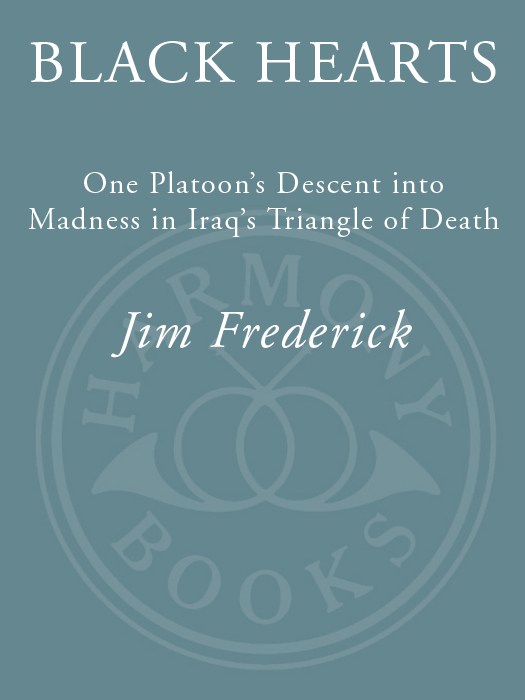
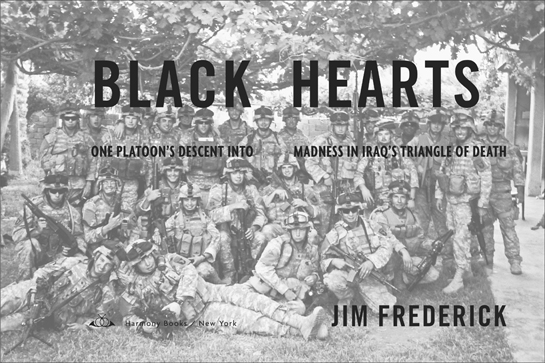
For my mother and father
In Memory Of:
Americas service members killed in action during the Iraq War, especially the men of 1st Battalion, 502nd Infantry Regiment/2nd Brigade Combat Team, 101st Airborne Division deployed to Mahmudiyah, Yusufiyah, and Lutufiyah, Iraq, 20052006.
First Lieutenant Garrison Avery, 23, Lincoln, Nebraska
Specialist David Babineau, 25, Springfield, Massachusetts
Specialist Ethan Biggers, 22, Beavercreek, Ohio
First Lieutenant Benjamin Britt, 24, Wheeler, Texas
Specialist Marlon Bustamante, 25, Corona, New York
Sergeant Kenith Casica, 32, Virginia Beach, Virginia
Staff Sergeant Jason Fegler, 24, Virginia Beach, Virginia
Sergeant Matthew Hunter, 31, Valley Grove, West Virginia
Private First Class Brian Kubik, 20, Harker Heights, Texas
Specialist William Lopez-Feliciano, 33, Quebradillas, Puerto Rico
Private First Class Tyler MacKenzie, 20, Evans, Colorado
Staff Sergeant Johnnie Mason, 32, Rio Vista, Texas
Private First Class Kristian Menchaca, 23, San Marcos, Texas
Specialist Joshua Munger, 22, Maysville, Missouri
Staff Sergeant Travis Nelson, 41, Anniston, Alabama
Specialist Anthony Chad Owens, 21, Conway, South Carolina
Captain Blake Russell, 35, Fort Worth, Texas
Specialist Benjamin Smith, 21, Hudson, Wisconsin
Private First Class Thomas Tucker, 25, Madras, Oregon
Private First Class Caesar Viglienzone, 21, Santa Rosa, California
Specialist Andrew Waits, 23, Waterford, Michigan
The innocent victims of the Iraq War, especially the Rashid al-Janabi family, Yusufiyah, Iraq. March 12, 2006.
Qassim Hamzah Rashid al-Janabi
Fakhriah Taha Mahsin Moussa al-Janabi
Abeer Qassim Hamzah Rashid al-Janabi
Hadeel Qassim Hamzah Rashid al-Janabi
Compassion is of value and enriches our life only when compassion is severe, which is to say when we can perceive everything that is good and bad about a character but are still able to feel that the sum of us as human beings is probably a little more good than awful. In any case, good or bad, it reminds us that life is like a gladiators arena for the soul and so we can feel strengthened by those who endure, and feel awe and pity for those who do not.
Norman Mailer
1:
2:
3:
4:
5:
6:
7:
8:
9:
10:
11:
12:
13:
14:
15:
16:
17:
18:
19:
20:
21:
22:
23:
24:
25:
26:
27:
I N LATE S EPTEMBER 2008, CBSs 60 Minutes aired a profile of U.S. Army general Ray Odierno, who, along with General David Petraeus, is credited with spearheading a new strategy that helped bring a dramatic decrease in violence to Iraq in 2007 and 2008. During that segment, he and correspondent Lesley Stahl walked around the marketplace of a town south of Baghdad called Mahmudiyah, one of the three corners of an area known as the Triangle of Death. As they walked and talkedneither, conspicuously, was wearing a helmetOdierno told Stahl that the area was once occupied by just 1,000 U.S. soldiers, who coped with more than a hundred attacks against them and Iraqi civilians each week. Today, including Iraqi security forces, Odierno said, the region is patrolled by 30,000 men and experiences only two attacks per week. (That comparatively low level of violence held well into late 2009.)
This book is about the soldiers deployed to that area back when the Triangle of Death lived up to its name, when it was arguably the countrys most dangerous region, at arguably its most dangerous time.
I first became interested in 1st Battalion, 502nd Infantry Regiment, 101st Airborne Division just after June 16, 2006. Working as Time magazines Tokyo bureau chief, I read a news report about three soldiers who had been overrun by insurgents at a remote checkpoint just southwest of Mahmudiyah. One trooper was dead on the scene and two were missing, presumed taken hostage. It was a gut-wrenching story, inviting horrible thoughts about what torture and desecration terrorists could inflict on captive soldiers. News of the search played out over the next few days, and on the 19th, the bodies were found, indeed mutilated, beheaded, burned, and booby-trapped with explosives.
About two weeks after that, another story from Iraq caught my eye. Four U.S. soldiers had been implicated in the March 2006 rape of a fourteen-year-old Iraqi girl, killing her, her parents, and her six-year-old sister. The crime was horrific and cold-blooded. The fourteen-year-old had been triply defiled: raped, murdered, and burned to a blackened char. The soldiers unit: 1st Battalion, 502nd Infantry Regiment, 101st Airborne Division. Because I followed both stories somewhat distractedly at first, it took a while for me to piece together that the accused were not just from the same company as the soldiers whod been ambushed several weeks prior but from the very same platoon: 1st Platoon, Bravo Company.
Two of the most notorious events from the war had flooded the headlines within days of each other, and they had happened within the same circle of approximately thirty-five men. What could possibly have been going on in that platoon? Were the two events related? As I was ruminating about such things, I got a call from Captain James Culp, a former infantry sergeant turned lawyer who was the Armys senior defense counsel at Camp Victory in Baghdad. He was a source for a story I had worked on a couple years back and he had since become a friend.
He phoned to tell me that he had been assigned to defend one of the soldiers accused of the rape-murders, and he implored me to look into Bravo Company, if not for the sake of my client, he said, then for the sake of the other guys in Bravo. He told me that he had been down to Mahmudiyah several times examining the crime scene and interviewing dozens of members of the company. He finished that first call with a chilling assessment. America has no idea what is going on with this war, he said. Im only twenty miles away, and most of the people on Victory have no idea how bloody the fight is down there. What that company is going through, it would turn your hair white.
Intrigued by what Culp told me, I tracked the trials of the accused soldiers as they wended their way to court over the next three years, either attending in person or reading the court transcripts. I contacted several men from 1st Platoon, to see if they were willing to talk. Surprisingly, they were. Despondent over being judged for the actions of a criminal few in their midst, they were eager to share their stories. The tales they told were raw and harrowing. They described for me the devastating losses they had suffered (seven dead in their platoon alone), the nearly daily roadside bombs called IEDs (improvised explosive devices) they had experienced, the frequent firefights they had fought, their belief that the chain of command had abandoned them, and the medical and psychological problems they were coping with to this day.
They were generous with their time, unvarnished in their honesty. They suggested I widen my scope, arguing that I could not properly understand the crime and the abduction if I did not understand their whole deployment, and I could not understand 1st Platoon if I did not understand 2nd and 3rd Platoons, who had labored under exactly the same conditions but who had come home with far fewer losses and their sense of brotherhood and accomplishment more intact. Check it out, they suggested, it might lead you someplace interesting about how the whole thing went down.
Font size:
Interval:
Bookmark:
Similar books «Black Hearts: One Platoons Descent into Madness in Iraqs Triangle of Death»
Look at similar books to Black Hearts: One Platoons Descent into Madness in Iraqs Triangle of Death. We have selected literature similar in name and meaning in the hope of providing readers with more options to find new, interesting, not yet read works.
Discussion, reviews of the book Black Hearts: One Platoons Descent into Madness in Iraqs Triangle of Death and just readers' own opinions. Leave your comments, write what you think about the work, its meaning or the main characters. Specify what exactly you liked and what you didn't like, and why you think so.

